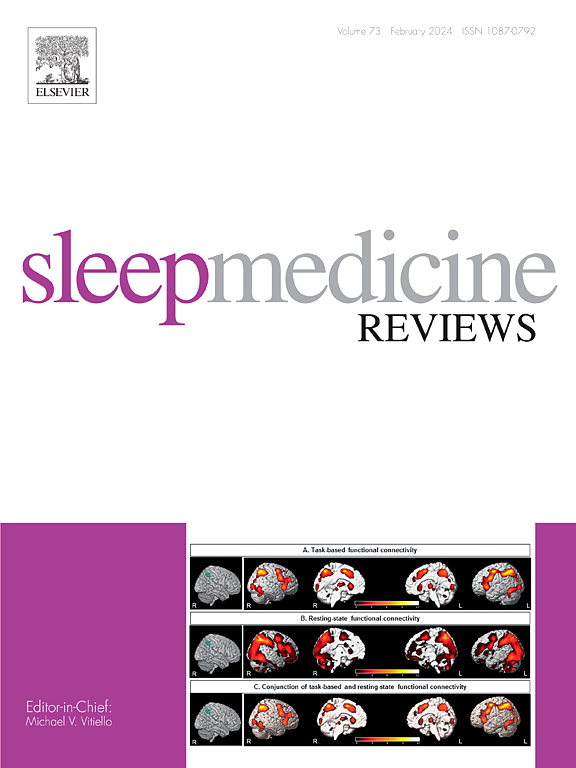Non-invasive brain stimulation to enhance sleep quality and architecture in Parkinson's disease: A systematic review and Bayesian network meta-analysis
IF 9.7
1区 医学
Q1 CLINICAL NEUROLOGY
引用次数: 0
Abstract
Individuals with Parkinson's disease (PD) suffer from sleep disorders and maladaptive alterations in sleep architecture. These disorders, which increase in frequency and severity as the disease progresses, are multifactorial and clinically relevant. Sleep problems drastically reduce quality of life in these patients and are associated with faster cognitive and motor decline. Standard treatments for managing sleep disorders, which mainly include cognitive behavioral therapy and pharmacotherapy, have provided inconsistent results. Non-invasive brain stimulation (NIBS) has been proposed as another potential strategy for improving sleep quality in PD. We conducted a systematic review and Bayesian network meta-analysis (NMA) following the grading of recommendations, assessment, development, and evaluation (GRADE), to determine whether NIBS improves sleep quality and architecture in PD. Evidence from twenty-four studies, including 792 individuals with PD in the early-to-severe disease stages, was summarized. Our NMA indicated that low-frequency repetitive transcranial magnetic stimulation over the dorsolateral prefrontal cortex (rTMS; 0.54, 95 %CrI: 0.13,0.93; moderate certainty) may ameliorate subjective sleep quality compared to a control condition. Our review further suggested that rTMS may enhance objective sleep quality and sleep architecture. Our findings, which should be interpreted cautiously due to a high risk of bias, are examined in the context of sleep disorders in PD.
非侵入性脑刺激提高帕金森病睡眠质量和结构:系统综述和贝叶斯网络荟萃分析
帕金森病患者(PD)患有睡眠障碍和睡眠结构的不适应改变。这些疾病,其频率和严重程度增加,随着疾病的进展,是多因素和临床相关的。睡眠问题大大降低了这些患者的生活质量,并与认知和运动能力的快速下降有关。管理睡眠障碍的标准治疗方法,主要包括认知行为疗法和药物疗法,提供了不一致的结果。非侵入性脑刺激(NIBS)被认为是改善PD患者睡眠质量的另一种潜在策略。我们在推荐、评估、发展和评估(GRADE)评分后进行了系统回顾和贝叶斯网络荟萃分析(NMA),以确定NIBS是否能改善PD患者的睡眠质量和结构。我们总结了24项研究的证据,其中包括792例处于疾病早期到严重阶段的PD患者。我们的NMA表明,低频重复经颅磁刺激在背外侧前额叶皮层(rTMS;0.54, 95% CrI: 0.13,0.93;与控制条件相比,中度确定性可以改善主观睡眠质量。我们的研究进一步表明,rTMS可以改善客观睡眠质量和睡眠结构。我们的研究结果在PD患者睡眠障碍的背景下进行了检查,由于存在较高的偏倚风险,因此应谨慎解释。
本文章由计算机程序翻译,如有差异,请以英文原文为准。
求助全文
约1分钟内获得全文
求助全文
来源期刊

Sleep Medicine Reviews
医学-临床神经学
CiteScore
20.10
自引率
3.80%
发文量
107
期刊介绍:
Sleep Medicine Reviews offers global coverage of sleep disorders, exploring their origins, diagnosis, treatment, and implications for related conditions at both individual and public health levels.
Articles comprehensively review clinical information from peer-reviewed journals across various disciplines in sleep medicine, encompassing pulmonology, psychiatry, psychology, physiology, otolaryngology, pediatrics, geriatrics, cardiology, dentistry, nursing, neurology, and general medicine.
The journal features narrative reviews, systematic reviews, and editorials addressing areas of controversy, debate, and future research within the field.
 求助内容:
求助内容: 应助结果提醒方式:
应助结果提醒方式:


